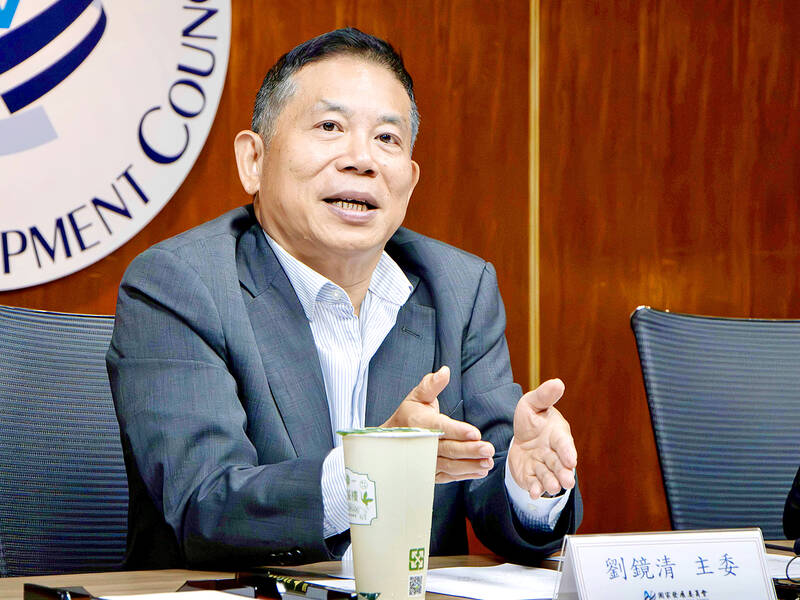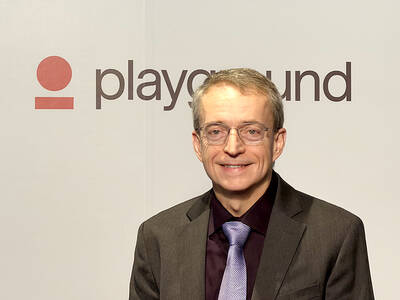Artificial intelligence (AI) has become a second economic pillar for Taiwan, after the booming semiconductor industry, National Development Council (NDC) Minister Paul Liu (劉鏡清) told an informal meeting with media on Tuesday.
"Taiwan doesn’t just have one ’huguo shenshan’ (sacred mountain protecting the nation), there is now also a second," Liu said.
Taiwan’s powerful semiconductor industry is often referred to as a "huguo shenshan" protecting it because the country produces more than 90 percent of the world’s high-end chips.

Photo courtesy of National Development Council
Noting that Taiwan is already a global AI hub with a significant global AI server market share, the entrepreneur-turned minister said he hopes Taiwan’s position in the global AI supply chain will be cemented through advancing AI hardware development, such as key components, cooling systems and processors.
Liu, who assumed office on Monday last week, said the NDC aims to help Taiwanese companies in the AI sector increase their overall global market share from just over 12 percent to 30 percent.
With semiconductors and AI as the dual cores of Taiwan’s economy, Liu pledged that the council would work with relevant government agencies to attract investment capital and talent to help these two industries develop.
Regarding income inequality in Taiwan, Liu said that if industries successfully shift to high-value operations, high-paying jobs and higher salaries will follow.
He pointed out that while about 60 percent of the country’s workforce is employed in the services industry, there are no world-renowned Taiwanese companies in the sector.
Therefore he proposed several strategies to boost the industry, including leveraging AI to enhance IT services. Liu also suggested integrating services across sectors through digitization and establishing holding companies to facilitate expansion into world markets.
Turning to Taiwan’s pathway to net-zero emissions in 2050, Liu said he was upbeat about the development of "turquoise hydrogen" to help lower carbon emissions, given that Academia Sinica has developed a new method of using natural gas decomposition to produce it.
Turquoise hydrogen, also known as low-carbon hydrogen, is a new method of producing hydrogen that results in significantly lower carbon emissions compared to traditional methods.
Liu explained that he will meet with experts from the institute on June 6 and that the goal is to commercialize the technology in the next three to five years.
Liu also said the government will also strive to reduce carbon emissions by promoting the Taiwan Renewable Energy Certificate (T-REC) system and green electricity trading.

JITTERS: Nexperia has a 20 percent market share for chips powering simpler features such as window controls, and changing supply chains could take years European carmakers are looking into ways to scratch components made with parts from China, spooked by deepening geopolitical spats playing out through chipmaker Nexperia BV and Beijing’s export controls on rare earths. To protect operations from trade ructions, several automakers are pushing major suppliers to find permanent alternatives to Chinese semiconductors, people familiar with the matter said. The industry is considering broader changes to its supply chain to adapt to shifting geopolitics, Europe’s main suppliers lobby CLEPA head Matthias Zink said. “We had some indications already — questions like: ‘How can you supply me without this dependency on China?’” Zink, who also

The number of Taiwanese working in the US rose to a record high of 137,000 last year, driven largely by Taiwan Semiconductor Manufacturing Co’s (TSMC, 台積電) rapid overseas expansion, according to government data released yesterday. A total of 666,000 Taiwanese nationals were employed abroad last year, an increase of 45,000 from 2023 and the highest level since the COVID-19 pandemic, data from the Directorate-General of Budget, Accounting and Statistics (DGBAS) showed. Overseas employment had steadily increased between 2009 and 2019, peaking at 739,000, before plunging to 319,000 in 2021 amid US-China trade tensions, global supply chain shifts, reshoring by Taiwanese companies and

Taiwan Semiconductor Manufacturing Co (TSMC, 台積電) received about NT$147 billion (US$4.71 billion) in subsidies from the US, Japanese, German and Chinese governments over the past two years for its global expansion. Financial data compiled by the world’s largest contract chipmaker showed the company secured NT$4.77 billion in subsidies from the governments in the third quarter, bringing the total for the first three quarters of the year to about NT$71.9 billion. Along with the NT$75.16 billion in financial aid TSMC received last year, the chipmaker obtained NT$147 billion in subsidies in almost two years, the data showed. The subsidies received by its subsidiaries —

OUTLOOK: Pat Gelsinger said he did not expect the heavy AI infrastructure investments by the major cloud service providers to cause an AI bubble to burst soon Building a resilient energy supply chain is crucial for Taiwan to develop artificial intelligence (AI) technology and grow its economy, former Intel Corp chief executive officer Pat Gelsinger said yesterday. Gelsinger, now a general partner at the US venture capital firm Playground Global LLC, was asked at a news conference in Taipei about his views on Taiwan’s hardware development and growing concern over an AI bubble. “Today, the greatest issue in Taiwan isn’t even in the software or in architecture. It is energy,” Gelsinger said. “You are not in the position to have a resilient energy supply chain, and that,